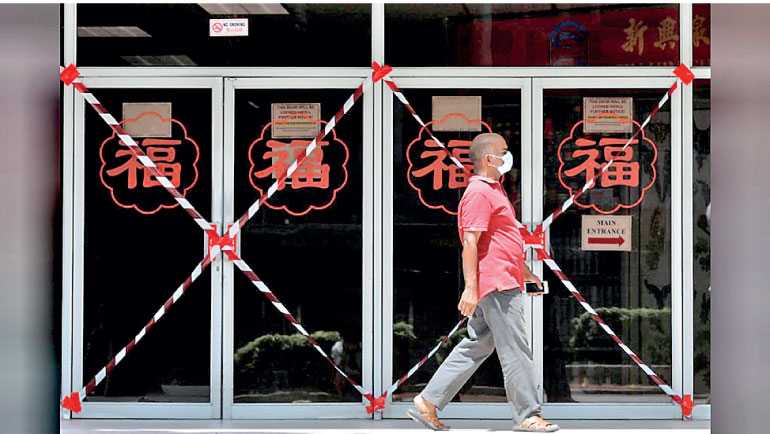Sunday Feb 22, 2026
Sunday Feb 22, 2026
Wednesday, 27 May 2020 00:44 - - {{hitsCtrl.values.hits}}

A man passes a closed off mall amid the coronavirus disease (COVID-19) outbreak in Singapore - Reuters
SINGAPORE (Reuters) - Singapore rolled out its fourth multi-billion-dollar stimulus package in as many months on Tuesday, as it forecast a deeper recession than previously expected with the COVID-19 pandemic battering the bellwether economy.
The new S$33 billion ($23.25 billion) package, unveiled by its finance minister in parliament takes the city-state’s support for households and businesses to nearly S$100 billion, or 20% of its GDP.
It came shortly after Singapore lowered its GDP forecast to a contraction range of -7% to -4% from the prior range of -1% to -4%, paving the way for its deepest recession in its 55-year history.
“This is a landmark package and the necessary response to an unprecedented crisis,” Heng Swee Keat said.
Singapore’s economy shrank 0.7% year-on-year in the first quarter and 4.7% quarter-on-quarter, a less severe decline than advance estimates, although officials and analysts warned of more pain ahead.
“There continues to be a significant degree of uncertainty over the length and severity of the COVID-19 outbreak, as well as the trajectory of the economic recovery,” said Gabriel Lim, permanent secretary at the ministry of trade and industry.
Following the downgrade, the central bank said monetary policy remains unchanged and will next be reviewed in October, as planned.
Singapore also cut its 2020 forecast for non-oil domestic exports to -4.0% to -1.0%, from -0.5% to 1.5% previously. Exports have been a rare bright spot for the trade-reliant economy in recent months mainly due to a surge in pharmaceutical shipments.
Singapore’s main price gauge, the core consumer price index, contracted for the third straight month in April, hitting a fresh 10-year low.
Analysts expect the Southeast Asian economy to see a deeper contraction in the second quarter due to a two-month lockdown, dubbed a “circuit breaker” by authorities, in which most workplaces were closed to curb the spread of the virus.
The city-state has among the highest number of infections in Asia and has said that easing of the lockdown from next week will only be done gradually.
Jeff Ng, senior treasury strategist at HL Bank, said Singapore’s lockdown could result in more than a 20% year-on-year contraction in the second quarter, underlining the need for hefty fiscal stimulus.
“Singapore has given a strong dose of medicine to try to support the current sickness of the economy,” Ng said.
Finance Minister Heng said the stimulus packages required the government to draw down up to S$52 billion from past reserves and are forecast to result in its biggest deficit in history of S$74.3 billion in FY2020.
The government first flagged the possibility of recession in February when it cut its 2020 GDP forecast to -0.5% to 1.5%, from 0.5% to 2.5% previously.